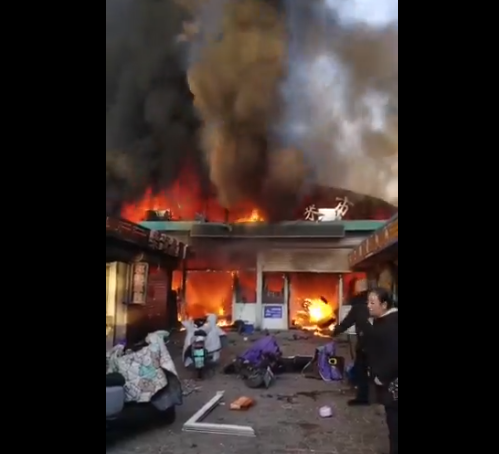A fire erupted at the Liguang Market in Zhangjiakou, northern China, on Saturday morning, killing eight people and injuring 15 others. The blaze, which engulfed the bustling market in Hebei province near Beijing, sent plumes of thick, black smoke into the sky and created panic among shoppers and vendors.
The fire reportedly began around 8:40 a.m. local time, state broadcaster CCTV said. Emergency services responded swiftly, containing the blaze by early afternoon. The Qiaoxi District People's Government confirmed that the injured have been hospitalized and are not currently in life-threatening condition.
Videos circulating on Chinese social media platforms, including Weibo, showed dramatic scenes of towering flames and dense smoke as panicked individuals fled the area. The Liguang Market, a sprawling hub for fresh produce, seafood, and even electronics, became the site of devastation in a matter of moments.
The cause of the fire remains under investigation, officials said. Early theories point to potential hazards common in traditional markets, such as aging infrastructure, gas bottles, charcoal fires for roasting meat, or improperly discarded cigarettes.
Markets like Liguang are popular for offering lower prices than modern supermarket chains but are often criticized for inadequate safety measures.
Eight people are dead and 15 injured after a fire broke out at a vegetable market in Zhangjiakou, northern China, on Saturday morning. The blaze, which started at 8:40 AM, was largely extinguished by noon. The cause of the fire is under investigation. pic.twitter.com/iG6IgIRJIe — Volcaholic (@volcaholic1) January 4, 2025
Opened in 2011, the Liguang Market serves as a vital economic hub for Zhangjiakou, which gained international attention as one of the host cities for the 2022 Winter Olympics. However, the tragedy highlights persistent concerns about safety standards in traditional markets across China.
By 2 p.m., the fire had been extinguished, but the aftermath left a grim reminder of the need for improved safety protocols. Local authorities have launched a thorough investigation to determine the fire's origins and assess any lapses in safety measures.
In recent years, fires and explosions at public venues in China have drawn scrutiny for often being linked to outdated infrastructure and lax oversight. Zhangjiakou, known for its historical significance and economic activity, now joins a list of cities grappling with the devastating consequences of insufficient fire safety measures.






